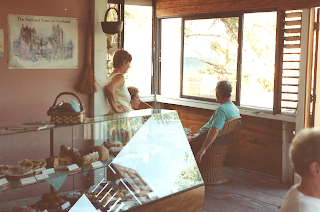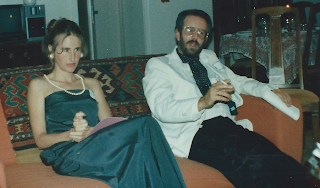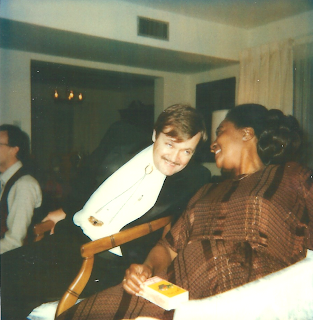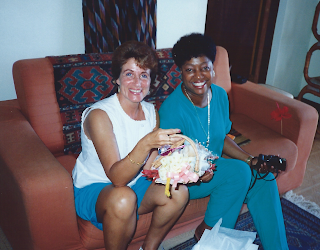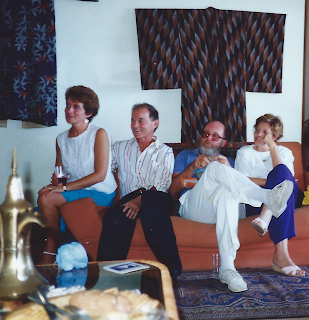 |
| Mapps College, a private secondary school for boys |
I hadn't noticed the high curtailment rate while I was in the consular section, but once Natalie volunteered for the African post, her assignment was curtailed, and I moved into her job, I saw things from a different viewpoint. The reasons for the curtailment requests were all different. The methods and strategies employees used to get their tours shortened were varied. The only common factor to most of them was that life in Barbados didn't turn out to be what people had thought it would be. The result was what we saw at that 40th birthday party in our first few weeks,
at least one unhappy person in every couple.
Natalie's was the first curtailment I knew of. She left Barbados within two years of arriving. And within weeks, Ed, the personnel officer, was the second curtailment, following the same pattern - he responded to another volunteer telegram for another position in Africa. He also left within two years of arriving. Then Rich, the general services officer, left. His curtailment resulted from
his wife's fight with his boss' secretary. He didn't want to leave, but the Department sent a compelling message that it would be better for his career if he and his wife left Barbados. They hadn't been in Barbados a year before they left.
 |
| Entrance to USAID in Bridgetown, Barbados |
The regional medical officer (RMO) requested a curtailment within six months of his arrival when he decided to retire instead of serve his full tour. The regional security officer (RSO) requested a curtailment when he and his wife made the decision to separate. They had a young child so he wanted to return to Washington in order to be near his child.
Then the administrative officer for another agency at the post requested a curtailment after just five months in country. He and his wife didn't find Barbados to be what they had expected. Barbro, the deputy chief of mission (DCM), one of the few people who had previously served in Barbados, decided we needed to look more closely at what was leading to so many early departures. She formed a Task Force. I was a member.
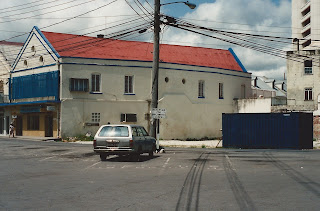 |
| Diplomatic parking lot, downtown Bridgetown |
Because so many people seemed to expect their tour in Barbados to be a vacation on the beach, we concluded that we needed to remove all the tourist brochures that were being sent to those assigned to Barbados so that we didn't contribute to that impression. We also looked at the slides that were available in the Overseas Briefing Office and discovered that they also emphasized the tourist side of life. We pulled out all the slides of sail boats, surfing, and beaches. We removed the brochures from Plantations nightclub (the venue of the
Miss Barbados pageant), Harrison's Cave, the Animal Flower Cave, the Jolly Roger Party Ship, and anything else that sounded like fun. And we set out to find replacements that would answer the questions about aspects of living on Barbados that most of us were unprepared for. We put together a video of life in Barbados to replace the tourist slide shows, including photos of the schools, the grocery stores, the commissary, the diplomatic parking lot, and other everyday sights that would be more common than beach scenes to give those preparing for a Barbados assignment more realistic expectations.
 |
| Embassy commissary |
One of the political officers requested a curtailment because of an incident at his 13-year-old daughter's school that made him decide his daughter needed to return to the U.S. for school. It was mid-way through the school year which made it very difficult to find a boarding school alternative. Curtailment was the only practical solution in their case.
Another disappointment for many families was the limited number of opportunities for spouses to work. There were very few jobs within the embassy, and there was no bilateral agreement to make it easy for Americans to get jobs on the local economy. A bilateral agreement would eliminate the requirement for Americans to get work permits. It took Alex 18 months to get a work permit. Most spouses weren't willing to wait that long. So employees requested curtailments.
Every curtailment left us with a staffing gap. It was more than a year before the regional medical officer position was filled after the previous RMO left the island to retire. The new RMO, Stuart, decided he was going to make it his private project to figure out why so many people requested curtailments. But before he had time to come to a conclusion, his 22-year-old son in the United States was diagnosed with cancer so he and his wife left just six months after he had arrived. Another curtailment.
 |
| Barbados car wash |
A new DCM secretary arrived just after Christmas after having spent several weeks in California getting her father settled in a retirement center. She chose Barbados because she had heard of State Department employees assigned to Ottawa or Paris, where living quarters allowances were used in place of leased housing, who had purchased a home. Up to 10% of the cost of a home could be covered through the living quarters allowance each year so she looked forward to her three years followed by an extension of a fourth year at the end of which she hoped she would have had the U.S. government pay 40% of the cost of a home where she could then retire and remain in the Caribbean. She also planned to bring her father down to Barbados to live with her.
What she didn't know was how much the real estate market in Barbados differed from those other countries. Sellers expected to get paid cash, and the banks didn't offer mortgages to foreigners. So her plans fizzled pretty quickly. On top of that, a week after she arrived, her father died and she had to return to California for his funeral. When she requested a curtailment, however, the Department decided to hold the line. They wouldn't approve her request; they insisted she return to Barbados. But within six months, she had made life for everyone around her so miserable that her boss, the DCM, took the one step she had the power to take to shorten her secretary's tour - she sent in a loss of confidence telegram so the Department ordered the secretary's return to Washington.
 |
| Grocery store |
Within a month of the arrival of Alex K, the successor to the management officer who approved my move from the consular section to the financial management office, he and the DCM became involved. The DCM and management officer positions are the two that ambassadors and the Department are eager to maintain some separation. Under normal circumstances, the management officer reports to the DCM who reports to the ambassador. That reporting structure makes it difficult for an ambassador to manage the rest of the mission if the DCM and management officer are married. So when the two of them married, the ambassador requested that their tours be curtailed so that he could have a new DCM and management officer assigned.
One of the information management officers traveled back to the U.S. on her Rest and Recuperation trip and while there she applied for a job with another federal agency. Within three months of her return to Barbados, she was offered a position with that agency, so she resigned and her tour was curtailed.
There was one person at post when I arrived there, Dave, the information programs officer, who had stayed through his entire three-year-tour and then extended for another year, definitely an exception. Before his fourth year ended, he requested a second extension, but the Department denied the request. So he left and was replaced by Tom*. Eighteen months later, half way through his tour, Tom requested a curtailment because his Brazilian wife wasn't comfortable in Barbados.
Antoinette, the successor to Margaret, the Deputy Consul, arrived in Barbados with her husband who worked for USAID. USAID didn't have a vacant position appropriate for her husband, but they did put him on a one-year contract. At the end of that year, when USAID couldn't extend the contract or come up with another assignment for him, Antoinette requested a curtailment.
Barbados didn't meet the expectations of those assigned there. And those who didn't stick around long enough to recognize what Barbados had to offer instead of what was expected missed a great opportunity. I will freely admit that we stayed in Barbados because it wouldn't have been fair to our son to pull him out of school again. He had already been in the secondary level in two other countries - England and Qatar. We stayed so that he could finish the secondary level. I'll always have that to thank our son for.
*a name, not necessarily the right one




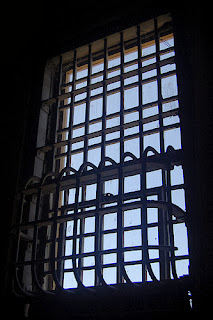

.jpg)

